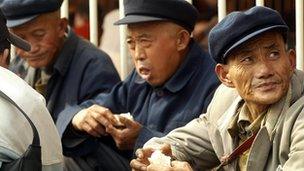Chinese leaders ponder a stable economic future
- Published

China's double-digit growth has created huge cities of gleaming skyscrapers, but China's leaders now look to be reining in that white-hot pace
Chen Jian's spanners and air pump spill out onto the street.
The repairman makes his living from fixing Beijing's bikes.
His small roadside business is just one of thousands dotted throughout the capital.
"It's harder to make money now because of inflation," he says, while fitting spokes on a wheel.
"Things will improve and I believe the economy will continue to grow quickly."
But China's leaders are not so confident.
During the country's annual parliamentary session, which finishes on Wednesday, Premier Wen Jiabao lowered China's growth target this year to 7.5%, although most economists think it will be closer to 8%.
It was not a huge surprise. As the world's largest exporter, China is being buffeted by a downturn in demand from its markets in Europe and elsewhere.
But the figure of 7.5% was also a clear sign that China's leaders want officials to focus on more sustainable economic growth.
Many economists are stressing that China needs to undertake fundamental reforms if it is to avoid serious economic problems in the future.
'Turning point'
More than 30 years ago, China's leader Deng Xiaopeng carried out a series of reforms that opened up the country's economy, transforming it into the workshop of the world.
But a World Bank Report says that China has reached "another turning point.... when a second strategic, and no less fundamental shift, is called for".
Released ahead of the annual parliamentary session, the report was co-authored with a wide-range of senior Chinese officials.
So what are China's leaders hoping to achieve? Well, at the moment, China's double-digit growth for the most of the last decade seems remarkable from the outside.
But much of the recent growth has been created by an investment binge by the authorities which was a response to the global financial crisis that began in 2008.

A nation of savers: People in China hold on to their money for retirement or in case they get sick
The country built new airports, roads, apartment and office blocks, which have transformed the cities and kept growth figures buoyant.
But many economists question the worth of these projects.
"You reach the point where you investments are no longer economically viable - you're actually throwing money away," says Michael Pettis, international finance professor at Peking University in Beijing.
"Every single country that has followed this model has ended up with a serious debt problem."
So China's leaders say they want to move away from this model. They want to see less reliance on investment and exports to drive growth - and more domestic consumption, which means Chinese consumers spending more.
At the moment, China's household spending is small compared with other developing nations - and almost half that of the West.
Social security
But how do you boost spending?
Well there are several ways. One way is to give higher wages to workers - if labourers have more money in their pockets, than they are likely to spend more.
The Chinese authorities also realise that they need to improve social security. That means providing better healthcare and old-age provisions for workers.
One of the problems in terms of domestic consumption is that the Chinese save large chunks of their salaries. Many save in case they need to pay a large medical bill, others for their retirement.
With improved social security, the Chinese would feel more confident to spend more money.
But none of this would come cheap. It will also require a fundamental shift in China's economic priorities.
At the moment, savers in China actually subsidise corporations and investment-led projects because interest rates are low, making for cheap loans.
The World Bank report recommends that China should reform its financial sector, making interest rates commercial.
That would make loans to state-owned enterprises and other corporations more expensive, but it would give savers more money because of higher interest rates.
The World Bank also recommends that state-owned enterprises should pay out bigger dividends to the government, which in turn could spend the money on social security.
But the fear is that many of these companies have become so used to cheap loans they would struggle to cope if they had to pay more.
Many could go bankrupt, leading to higher unemployment and potentially serious social unrest.
So, when are we likely to see any major changes?
With the forthcoming leadership change starting later this year, China's leaders are prioritising stability over anything else at the moment.
"If you compare this government with others that came before, it's not very adventurous," says Dr Qian Liu of the Economist Intelligence Unit.
"Any major reforms will only start in 2014 once the new generation of leaders are firmly in power."
- Published5 March 2012
- Published5 March 2012
- Published10 February 2012